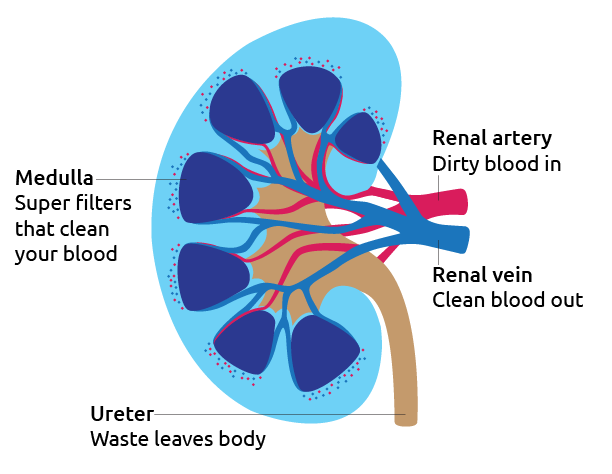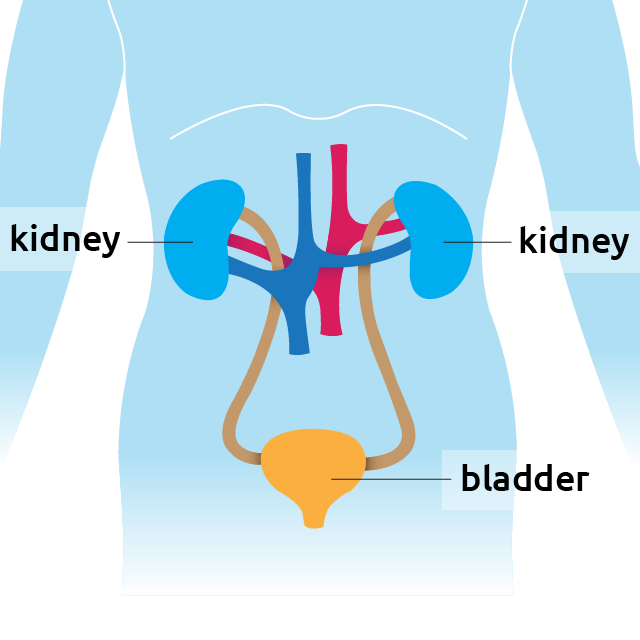Kidney
The kidneys are a vital organ in the human body. More than 600,000 Americans currently receive treatment with dialysis or have received a kidney transplant to stay alive. Learn more about kidney disease, prevention, and treatment through our Kidney Transplant Learning Center.

Stories of hope
Each person touched by organ donation and transplant has a unique story. Read about lives changedThe kidneys are a pair of bean-shaped organs located on either side of the spine just below the diaphragm, behind the liver and stomach. They filter out waste and extra fluid from your body.
For patients: Learn about waiting time modifications for Black kidney candidates
How the kidney works
Your kidneys play a vital role in balancing the amount of fluid in your body, detecting waste in your blood, and knowing when to release the vitamins, minerals, and hormones you need to stay alive. They do this by disposing of waste products and turning them into urine. Learn more about how the kidneys work.
Kidney disease & treatment
Kidney disease can occur for a number of reasons ranging from genetics to health and lifestyle choices. Follow the link below to learn more about preventing kidney disease and your treatment options.
Dialysis
Dialysis is a treatment option for kidney failure or disease. Dialysis is a process that cleans your blood and filters out waste which is the purpose of the kidneys. Follow the link below to learn more about dialysis.
Living donation
Living donation is a treatment option for kidney failure or disease through organ donation from a healthy, living person who is a match. Follow the link below to learn more about living kidney donation.
About a kidney transplant operation

Preparing for the hospital
In preparing for your kidney transplant surgery, use the following checklist to prepare for your procedure:
- Select your primary support person. Choose someone you feel close to who has the time, health, and flexibility to be your caregiver. You need to know you are not a burden to this person. For caregivers, follow this link for more information on caring for patients.
- Prepare a phone/email tree. This will make it easier for your caregiver to update friends and family while cutting down on phone or email volume.
- Organize your personal affairs. Consider filling out an advanced directive, writing a will, and sharing access to bank accounts, e-mail, or blogs with a trusted loved one. You may also need to fill out Family Medical Leave Act, insurance, or loan deferment paperwork.
- Consider dependent care. Find someone you trust and set up a plan to take care of your children and/or pets. Ask your doctor when you can expect to see your children and pets after your transplant.
- Arrange transportation. You will want to plan how to get to the transplant center quickly when you get the call that an organ is available. Be sure to make these arrangements well in advance. If you are relocating, make sure you make housing arrangements in advance.
- Pack your bags. You’ll need to be ready to leave as soon as you get the call that an organ is available. Include insurance information, a list of medications, an extra 24-hour supply of medication, and other necessities.

The procedure
An incision is made in the lower part of one side of the abdomen, the donor kidney is placed in the recipient, and blood vessels and the ureter from the donor kidney are connected to vessels in the recipient. The recipient’s kidney is typically not removed unless special circumstances are identified by the surgeon. Once all connections have been made, the incision is closed.
The kidney or renal transplant surgical procedure takes approximately three to four hours to complete. Because the length of this surgery is different for every patient, families should talk with the surgeon about what to expect.

During recovery
Postoperative care begins with a team of health professionals within the hospital. Careful, comprehensive post-surgical monitoring constantly evaluates whether the body is accepting the new organ. In addition, the amount of time you spend in the recovery room, waking up and getting to the point that you’re ready to go home, will vary from patient to patient. Because individual experience after recovery is so unique, it is important to discuss with your physician what to expect after surgery.
Reference and Publication Information
Leaders in transplant excellence
UNOS works with leading educational partners to provide accurate, trustworthy health information. Our educational partners include:
Special thanks to our corporate sponsor for supporting excellence in transplant education:




